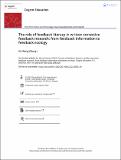Files in this item
The role of feedback literacy in written corrective feedback research : from feedback information to feedback ecology
Item metadata
| dc.contributor.author | Chong , SW | |
| dc.date.accessioned | 2022-10-10T11:30:13Z | |
| dc.date.available | 2022-10-10T11:30:13Z | |
| dc.date.issued | 2022-10-01 | |
| dc.identifier | 279689892 | |
| dc.identifier | a1050d06-59f9-45d4-864a-5744c9e9066d | |
| dc.identifier | 85131590102 | |
| dc.identifier.citation | Chong , SW 2022 , ' The role of feedback literacy in written corrective feedback research : from feedback information to feedback ecology ' , Cogent Education , vol. 9 , no. 1 . https://doi.org/10.1080/2331186X.2022.2082120 | en |
| dc.identifier.other | ORCID: /0000-0002-4519-0544/work/116910284 | |
| dc.identifier.uri | https://hdl.handle.net/10023/26163 | |
| dc.description.abstract | Research on written corrective feedback (WCF) has received sustained interest in the field of second language acquisition and language education. This viewpoint article extends the theoretical and conceptual discussion on WCF research by introducing the notions of “feedback literacy” and “feedback ecology”. In this article, I first review three strands of WCF research. Then, I argue for the need to shift the focus of our investigation from feedback information (focusing on impact of feedback), to feedback process (focusing on learners “and teachers” perception of feedback), to feedback ecology (focusing on learners’ and teachers’ engagement of feedback and influences of such engagement). Putting forward a “feedback ecology” conceptual framework that is informed by Ecological Systems Theory, Actor-network Theory, and Complex Dynamic Systems Theory, I suggest three research tasks for future WCF studies, highlighting the affordances of qualitative research methodologies such as narrative inquiry. | |
| dc.format.extent | 13 | |
| dc.format.extent | 2058636 | |
| dc.language.iso | eng | |
| dc.relation.ispartof | Cogent Education | en |
| dc.subject | Written corrective feedback | en |
| dc.subject | Feedback literacy | en |
| dc.subject | Feedback ecology | en |
| dc.subject | LB2300 Higher Education | en |
| dc.subject.lcc | LB2300 | en |
| dc.title | The role of feedback literacy in written corrective feedback research : from feedback information to feedback ecology | en |
| dc.type | Journal article | en |
| dc.contributor.institution | University of St Andrews. International Education Institute | en |
| dc.identifier.doi | https://doi.org/10.1080/2331186X.2022.2082120 | |
| dc.description.status | Peer reviewed | en |
This item appears in the following Collection(s)
Items in the St Andrews Research Repository are protected by copyright, with all rights reserved, unless otherwise indicated.

